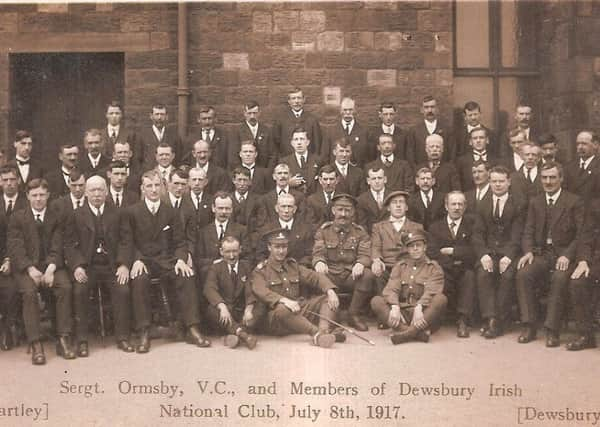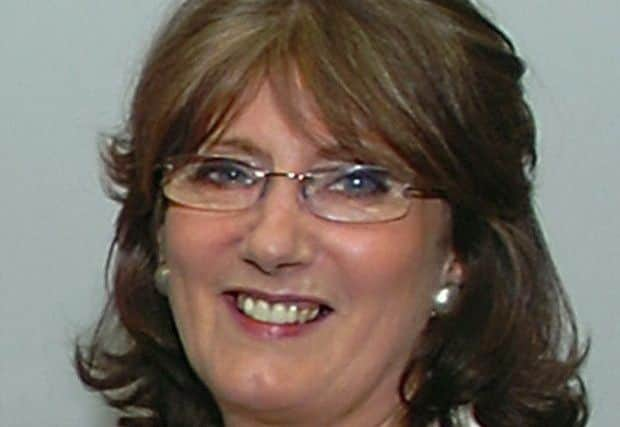The Nostalgia column with Margaret Watson


We have read of their losses and been moved to tears at the sadness of it all, even though we never knew them.
If our hearts break at the sorrow of what strangers suffered, imagine if you possibly can what it must have been like for them.
Advertisement
Hide AdAdvertisement
Hide AdFor we have read of mothers who lost three or four sons, mothers who lost their only child, and of the brother who, in the midst of battle, came across his dying brother.


He wrote to his mother to tell her he had not died alone, that he had kissed him, held his hand, and said a prayer, before he had too had to move on.
These were the kind of stories people back home were reading about and weeping over for the four long years of the duration of the war.
The sufferings and tragedies which people endured throughout it all did not end with the signing of the Armistice.
Advertisement
Hide AdAdvertisement
Hide AdIt would continue with thousands of soldiers later dying of wounds sustained in the war.
And for those who were severely disabled, had lost limbs, were blinded and shell shocked.
There are people living in our midst today who were children when their disabled fathers returned home. These men were heroes too but there is no monument to them.
These men were not looked after as they had been promised when they first marched off to war.
Advertisement
Hide AdAdvertisement
Hide AdPromises made to them by the Government and business leaders that their jobs would be waiting for them when they returned, were not always kept.
Nor did they keep their promise that “Homes Fit for Heroes” would be built for them on their return.
The war pensions of injured soldiers were degradingly low, and some had to resort to going door to door selling bootlaces.
There were other sufferings people would endure after the Armistice, caused by the continuation of a world-wide influenza epidemic.
Advertisement
Hide AdAdvertisement
Hide AdDewsbury did not escape this catastrophe, and among those worst hit, were the Breheney family of Knowles Yard, Boothroyd Lane, Westtown.
They lost three members to influenza, in the same week, two on the same day, all living in the same house.
The first to die, just days before the Armistice, was Sgt Joe Breheney MM, who had lost an arm in the war, and had returned home after being discharged because of injuries. He was 26.
His father Hugh Breheney, aged 61, and brother James, 38, died the following day.
Advertisement
Hide AdAdvertisement
Hide AdSgt Breheney, who had been awarded the Military Medal for outstanding bravery, was accorded a military funeral.
The cortege left St Paulinus Church, Westtown, headed by wounded soldiers from Staincliffe Base Hospital, and also 24 men from the Army Ordnance Corps.
They were followed to Dewsbury Cemetery by soldiers home on leave, and 100 local discharged soldiers.
A firing party of men from the Base Hospital, fired shots over his grave, and Band Sgt Arnie Fothergill, of the local volunteers, sounded the ‘Last Post.’
Advertisement
Hide AdAdvertisement
Hide AdA professional soldier from the age of 18, Sgt Breheney had served in the 2nd Battalion, King’s Own Yorkshire Light Infantry, and rapidly rose through the ranks.
He was one of many unsung heroes from Dewsbury, whose names, for reasons unknown, does not appear on the Cenotaph in Crow Nest Park.
In one letter sent home, he wrote:
“I am expecting my furlough any time now. I am waiting patiently and by the help of God my chance will come soon. We had it hot on Sunday. The Germans tried to blow our trenches up, but they failed in the attempt and we gave them something to go on with. A Batley lad whom I played football against at home got killed. I am getting some shells made into coal scuttles ready for when I come on furlough – a Belgian and a French ’75, which has given the Germans some stick.
“J. Nocton is in the same brigade as me; I was talking to him the other day. I think it is about time some of us who have been out here so long were sent home and some of the ‘know-alls’ at home sent to take our places.
“It would break the hearts of some of them.”
Advertisement
Hide AdAdvertisement
Hide AdLater in the war he was wounded and treated in a French Hospital.
The following is a letter sent to his mother by a nurse tending him there:
“Dear Madam, – Your son has asked me to write and let you know he is in hospital. He was severely wounded in the arm and I regret to say he had to lose it.
“He has been easier since, and is slowly mending. He does not wish you to worry, as in about a week’s time he will probably go down to the base and possibly to England.”
Advertisement
Hide AdAdvertisement
Hide AdSgt Breheney was a bosom pal of Dewsbury VC Sgt John William Ormsby, and the two men had fought side-by-side throughout most of the war.
They also went to Buckingham Palace together to collect their awards, Sgt Ormsby, his Victoria Cross, and Sgt Breheney, his Military Medal.
Both men had attended the same school and church, St Paulinus, and both were members of the Dewsbury Irish National Club.
A former Dewsbury Celtic player, Joe Breheney had been a part of the 1913 –1914 team which won the Heavy Woollen District Intermediate League Cup.
○ Grateful thanks for the help given to me by the authors of the book “The Men of Our Lady and St Paulinus – a history of the men who fell in the two World Wars.